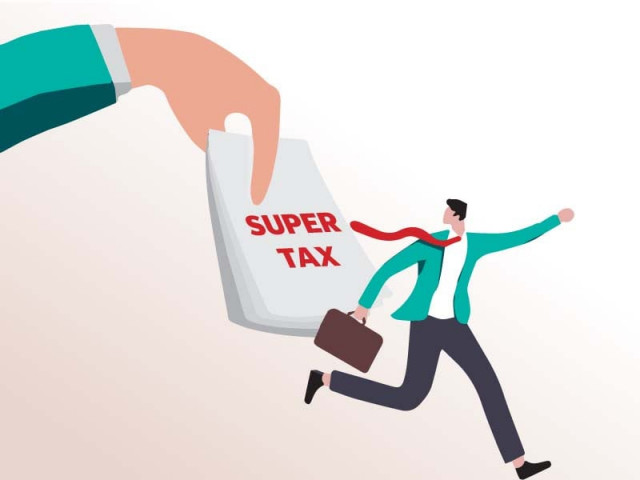10% super tax to stay in upcoming fiscal year
RRMC recommends incorporating super tax into Income Tax Ordinance

Contrary to its promise to the business community, the government has no plans to repeal the 10% super tax imposed on the wealthy in the upcoming fiscal year. The Reform Commission has also recommended collecting this tax in advance from the public.
Sources within the Federal Board of Revenue (FBR) informed The Express Tribune that there is currently no proposal to withdraw the 1% to 10% tax imposed on affluent individuals and companies. However, they added that the final decision rests with the political leadership, which initially assured that the super tax would only be imposed for one year - fiscal year 2022-23, concluding on June 30th.
The Reforms and Revenue Mobilisation Commission (RRMC) has recommended incorporating the super tax into Section 147 of the Income Tax Ordinance and collecting it in two advance instalments from taxpayers. To ensure fairness between companies and associations of persons, the Ashfaq Tola-led RRMC Commission has proposed a 10% tax on associations of persons and sole proprietors, excluding professional service providers. In his budget wind-up speech, the former-finance minister Miftah Ismail announced the imposition of a “one-time super tax” ranging from 1% to 10% on large firms. Prime Minister Shehbaz Sharif also reiterated this promise. However, The Express Tribune reported at that time that the government did not have a plan to fulfil its commitment.
According to Section 4C of the Income Tax Ordinance, which pertains to the super tax, the imposition of the super tax will continue for the tax year 2022 and beyond. However, for the tax year 2022, individuals and companies engaged in certain sectors, including airlines, automobiles, beverages, cement, chemicals, cigarette and tobacco, fertiliser, iron and steel, LNG terminal, oil marketing, oil refining, petroleum and gas exploration and production, pharmaceuticals, sugar, and textiles, will be subject to a 10% tax rate if their income exceeds Rs300 million.
The 4% super tax collected from individuals and all companies should be maintained, but the government may consider withdrawing the 10% super tax imposed on the 13 specified sectors, said the former finance minister.
The RRMC acknowledged in its report that the effective income tax rate for companies is 51%, which is higher than the standard income tax rate of 29%, due to the inclusion of various types of taxes.
However, the RRMC also recommends the continuation of the Super Tax. According to its interim report, there is currently no explicit requirement for taxpayers to discharge their tax liability in advance. The RRMC suggests amending section 147 of the Ordinance to hold taxpayers responsible for paying advance tax against liabilities determined under the Super Tax and the deemed income tax on real estate.
The report further states that if a taxpayer estimates that their tax liability for the tax year 2023 is zero or lower than their tax liability in the tax year 2022, they should file an estimate justifying the lower amount along with supporting evidence. However, the taxpayer must ensure that at least 90% of the tax payable is paid as advance tax. If the advance tax payment is less than 90% of the actual tax liability, a default surcharge should be applied for the shortfall in the advance tax payment.
More taxes on Association of Persons
The RRMC has recommended that the government impose an additional 10% income tax on Associations of Persons (AoPs) and sole proprietors in order to align their tax liability with that of a company.
According to the report, sole proprietors and AoPs are able to conduct their businesses without regulatory oversight or limits. Additionally, their tax burden on profits is approximately 10% lower compared to that of a company.
The RRMC proposes amending corporate law to require individuals engaging in business activities beyond certain limits to incorporate their businesses. This would help ensure regulatory compliance and fairness in tax liability.
The report suggests increasing the tax burden on sole proprietors and AoPs (excluding professionals who are restricted from incorporating) by 10%. The finance minister established the Commission to review existing tax laws and recommend measures for enhancing tax collection.
Furthermore, the RRMC recommends increasing the tax rate on non-corporate exporters from the current 1% to 8%. This adjustment accounts for the dividend tax not paid by non-corporate entities in comparison to corporations.
Currently, companies act as withholding agents and are obligated to deduct withholding tax from payments made under various provisions of the Income Tax Ordinance. The Commission suggests expanding these withholding obligations to apply to all individuals conducting business, whether through a company or otherwise.
Published in The Express Tribune, May 17th, 2023.
Like Business on Facebook, follow @TribuneBiz on Twitter to stay informed and join in the conversation.



















COMMENTS
Comments are moderated and generally will be posted if they are on-topic and not abusive.
For more information, please see our Comments FAQ